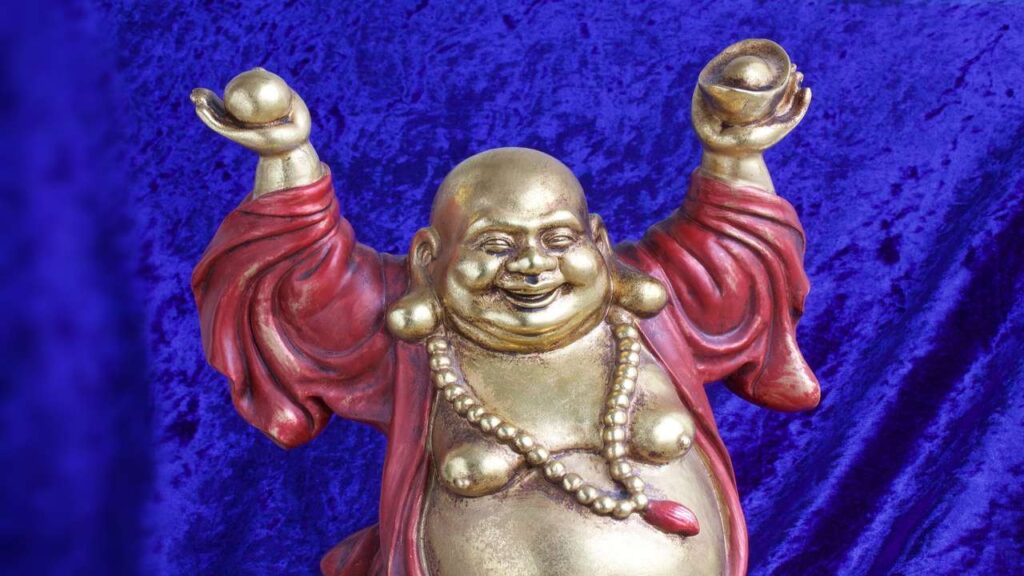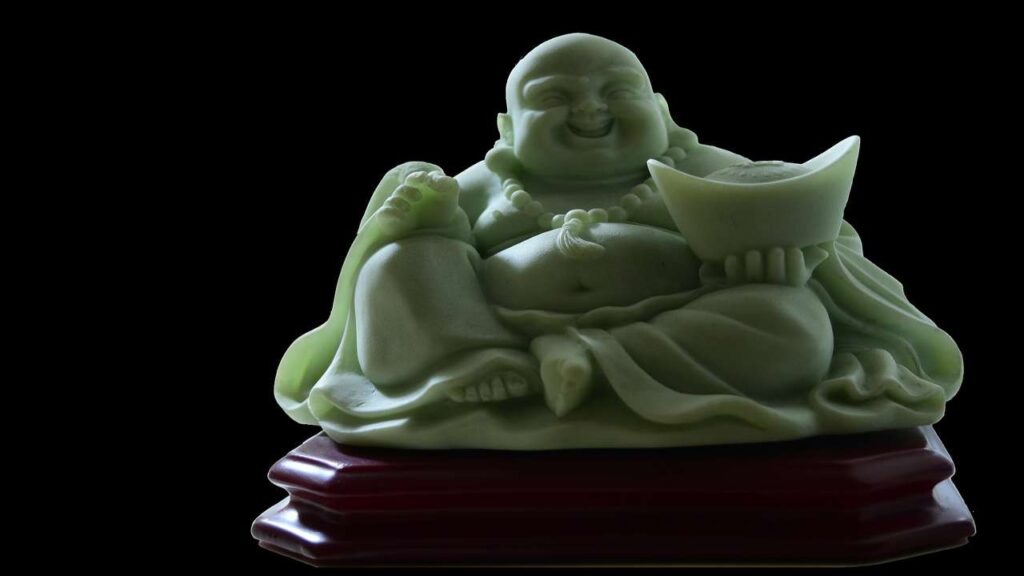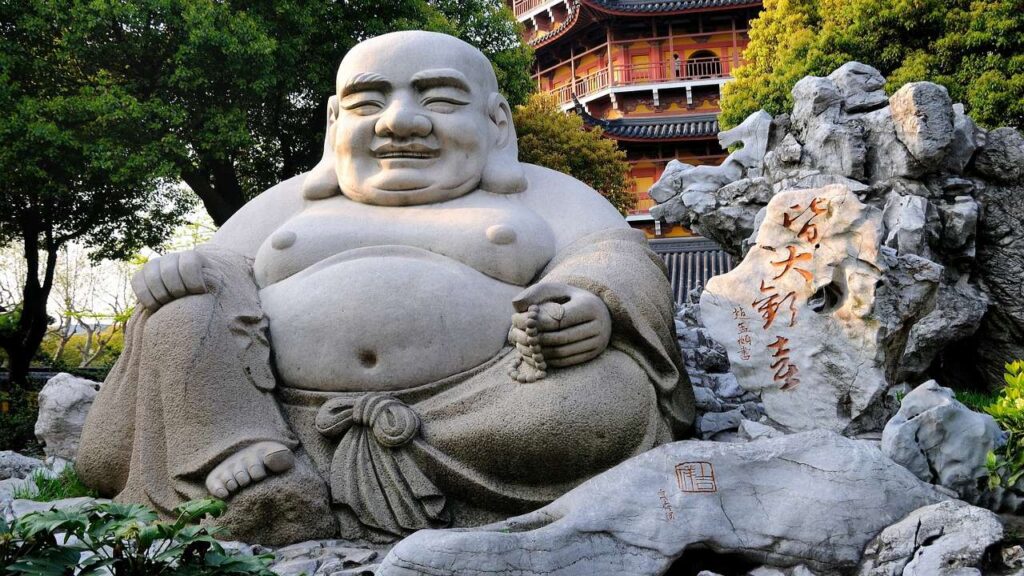The Laughing Buddha, also known as “Budai” or “Hotei” in Chinese and Japanese traditions, is a beloved figure symbolizing happiness, abundance, and good fortune. With his joyful expression and round belly, he stands as an icon of positivity in homes, businesses, and spiritual spaces across the world. But who exactly is the Laughing Buddha, and why is he so widely cherished?

In this article, we’ll explore the origins of the Laughing Buddha, his symbolism, and the ways to bring his joyful energy into your life.
Table of Contents
1. Who is the Laughing Buddha? Origins and Legend
Laughing Buddha is not to be confused with Siddhartha Gautama, the founder of Buddhism. Instead, he is often identified as a monk named Budai (Hotei in Japan) who lived during the 10th century in China. Known for his eccentric personality, Budai was loved by the people for his cheerful disposition, generosity, and wisdom. His image is usually that of a portly, bald monk with a big smile and a large belly—a symbol of contentment and abundance.
According to legend, Budai was a wandering monk who carried a cloth sack filled with gifts and sweets for children, symbolizing his role as a bringer of happiness. Over time, his image evolved, and he became associated with the Maitreya, the “future Buddha” who is prophesied to bring enlightenment and peace. Today, the Laughing Buddha is celebrated as a symbol of joy, wealth, and success.
2. Symbolism of the Laughing Buddha

Laughing Buddha is laden with symbols that represent different forms of abundance and well-being:
- Happiness and Joy: Laughing Buddha’s cheerful face and open smile represent pure joy and optimism. His laughter is believed to dispel negative energy and stress, promoting a positive outlook.
- Abundance and Wealth: The round belly and full-bodied form of Laughing Buddha are symbols of prosperity and abundance. His image is thought to attract good fortune and financial success, making him a popular addition to homes and businesses.
- Protection and Peace: Laughing Buddha is said to have the power to absorb worries and stresses. His relaxed, happy demeanor encourages inner peace and resilience in difficult times.
- Good Luck and Prosperity: Many believe that rubbing Laughing Buddha’s belly brings good luck and positive energy. This practice is especially common in Feng Shui, where he is seen as a harbinger of fortune and blessings.
3. Different Forms and Meanings of the Laughing Buddha

Laughing Buddha can be depicted in various poses and with different objects, each carrying a unique meaning:
- Laughing Buddha with a Sack: This version shows him carrying a large sack over his shoulder, representing his role as a provider. It symbolizes the removal of sorrow and hardship.
- Laughing Buddha with Gold Coins: Often depicted holding gold coins or an ingot, this form signifies wealth and financial growth. It is commonly used in Feng Shui to attract abundance.
- Laughing Buddha with Children: Surrounded by children, the Laughing Buddha signifies blessings of family happiness and fertility. This is a popular symbol for those seeking family harmony and growth.
- Laughing Buddha with a Fan: The fan represents the warding off of misfortune and negative energy. It symbolizes freedom from worry and the manifestation of wishes.
- Meditating Laughing Buddha: Depicted in a seated, meditative pose, this version represents inner peace, mindfulness, and contentment.
4. Using the Laughing Buddha in Feng Shui
In Feng Shui, Laughing Buddha is a popular symbol for attracting positive energy and good fortune. Here are some tips on placing the Laughing Buddha in your home or workspace:
- Entrance of the Home or Office: Placing the Laughing Buddha at the main entrance is believed to welcome good energy and blessings, helping to bring luck to all who enter.
- Wealth Area: The southeast corner is considered the “wealth corner” in Feng Shui. Placing the Laughing Buddha here can invite financial prosperity.
- Living Room or Common Areas: Positioning the Laughing Buddha in shared spaces helps foster harmony and happiness among family members and friends.
- On the Desk: If you’re looking to attract professional success, place a small Laughing Buddha on your desk. It can serve as a reminder to stay positive and to keep stress at bay.
5. How to Choose Your Laughing Buddha
Choosing the right Laughing Buddha for your space depends on your personal goals. Whether you are looking for joy, financial success, or inner peace, there is likely a specific representation of Laughing Buddha that aligns with your intentions:
- For Wealth and Abundance: Select a Laughing Buddha holding coins or a wealth pot. This version is ideal for attracting prosperity and financial growth.
- For Family Happiness: A Laughing Buddha with children represents family harmony, love, and fertility.
- For Good Luck and Happiness: The classic Laughing Buddha with his hands raised in a joyful gesture is perfect for attracting good fortune and dispelling negativity.
- For Inner Peace: The meditative Laughing Buddha, often depicted in a seated or lotus position, symbolizes tranquility and is ideal for fostering a sense of calm and mindfulness.
6. Myths and Beliefs Surrounding the Laughing Buddha
Laughing Buddha is steeped in numerous myths and beliefs that add to his mystique:
- Belly Rubbing: One popular belief is that rubbing the Laughing Buddha’s belly brings good luck, happiness, and prosperity. Many people incorporate this as a daily ritual.
- A Figure of Contentment: The Laughing Buddha’s round shape is often seen as a sign of contentment, as he is thought to carry the weight of others’ burdens, leaving them lighter and happier.
- A Symbol of Generosity: His sack is believed to carry people’s troubles, removing their worries and spreading joy wherever he goes.
These myths reinforce the Laughing Buddha’s role as a bringer of good fortune and as a reminder to live with joy, gratitude, and kindness.
7. Incorporating the Laughing Buddha into Daily Life
Beyond being a decorative piece, the Laughing Buddha serves as a spiritual and motivational symbol:
- Meditation and Mindfulness: Start or end your day with a moment of mindfulness by focusing on the Laughing Buddha’s peaceful expression. This can remind you to approach life with lightness and joy.
- Positive Intention Setting: Let the Laughing Buddha inspire you to set positive intentions for the day. Whether it’s finding happiness in small moments or practicing gratitude, his presence can be a reminder of these goals.
- Encouraging a Generous Spirit: The Laughing Buddha’s legendary generosity can inspire you to share positivity and kindness with others, contributing to an environment of joy and contentment.
Conclusion
Laughing Buddha is much more than a cheerful figure; he represents a lifestyle of joy, resilience, and gratitude. Bringing a Laughing Buddha into your space can be a powerful reminder to focus on the positive, stay grounded in happiness, and appreciate life’s blessings. Whether you seek good fortune, family happiness, or inner peace, the Laughing Buddha is a beautiful symbol of abundance and a powerful tool for mindfulness and positivity.
Disclaimer
The information provided on this blog is for general informational and entertainment purposes only. While Feng Shui is a traditional practice rooted in ancient philosophies, its effectiveness is subjective and may vary for each individual. The content on this blog, including tips, suggestions, and interpretations, should not be considered as professional, financial, legal, medical, or psychological advice.
Readers are encouraged to use their own discretion and consult with qualified professionals before making significant life decisions based on Feng Shui principles. The author(s) and publisher of this blog are not responsible for any outcomes, results, or consequences arising from the application of the information shared here.
By using this blog, you acknowledge that you are doing so at your own risk and that the content is provided “as is” without any warranties or guarantees.
If you have any questions or concerns, please consult with a certified Feng Shui expert or other relevant professional.

Pingback: Unlocking Wealth: 10 Feng Shui Symbols for Attracting Money and Abundance in Upcoming New Year 2025 - MoneySiddhi
The elegance in your writing is apparent in every line, creating a sense of harmony that lingers.